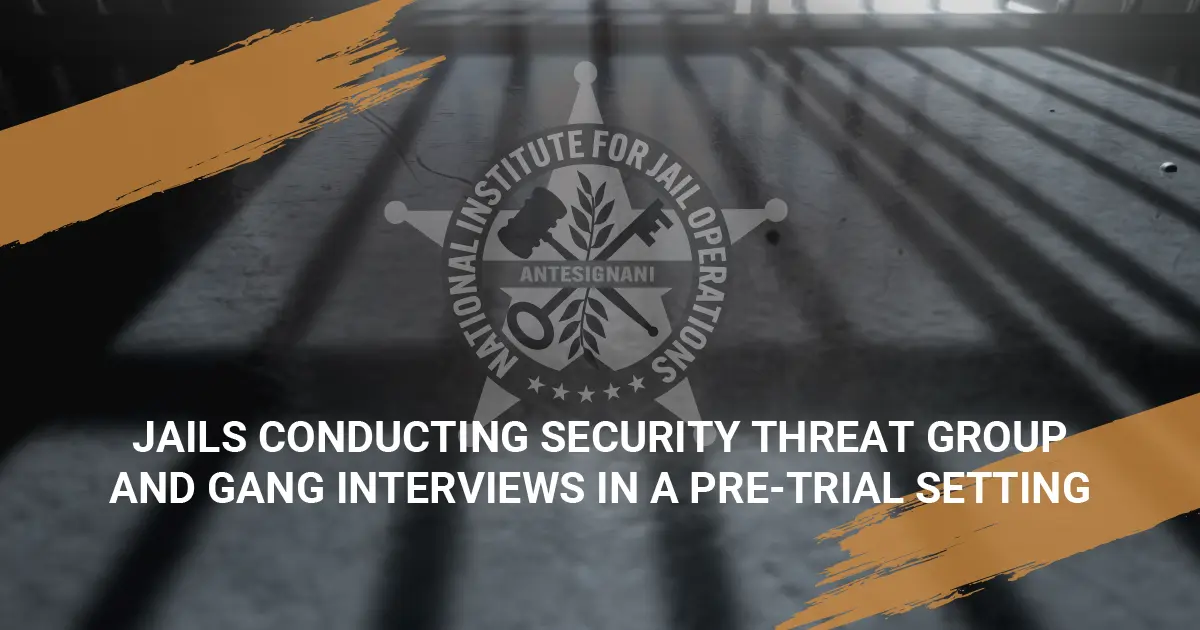By Expert: Sean Stewart, NCCE
One of the most important aspects of classification and the subsequent housing of individuals being booked into your facilities is the ability to identify who is a security threat to your facility, inmates and staff. Street and prison gang members pose the greatest risk to the safe and secure operation of your facility if not classified correctly. One the most important indicators of gang membership or association other than tattoos is the interview. In a corrections setting we conduct many types of interviews such as intake, classification, protective custody and administrative segregation to name a few. We also find ourselves conducting in house criminal investigations and intelligence gathering interviews.
For the purpose of this article the main focus will be on interviews conducted for the purpose of identifying individuals who are suspected of being involved in either street gang or prison gang activity. The opportunity to talk with or interview a gang member should not be turned down. I have found it is best when the inmate initiates the process and requests to talk to you. If they are requesting to talk to you through a third party such as the housing unit officer have that officer document that the inmate is requesting to speak with you. If time constraints are not a consideration have the inmate put his or her request in writing. This will assist you in the future should the inmate or his attorney try to use this in an adverse manner against you, in court, later on.
INTERVIEW VS. INTERROGATION
Interview…………………………….Interrogation
Get Info………………………………Get Confession
Note taking is ok ………………….Show No Notes
Interviewee talks the most ……You Talk the Most
Friendly ……………………………..Not Friendly
Supportive (Good Cop) ………..Accusatory (Bad Cop)
You Both Sit ……………………….They Sit, You Stand
In a corrections setting regarding gang members we will mostly be conducting interviews not interrogations.
BE PREPARED FOR THE INTERVIEW
- Never go into an interview with a gang member unprepared
- Do your homework –
- They have done theirs!
- Review the current file, NCIC/rap sheet, past reports any gang files, etc.
- Check Pre-sentence reports
- Check their prison & jail files
- Review any past parole & probation files
- Check computerized gang networks
- Check with other agencies who may have had contact with this individual
Know more than he/she thinks you do, this will allow you to be aware when they are lying to you or trying to manipulate you. “They will try to manipulate and mislead you.”
PREPARATION FOR THE INTERVIEW
- Become familiar with their street gang, prison gang or criminal organization
- Speak to investigators, officers and other staff members that may be familiar with them
- Be aware of games and manipulation
- Know the cultural background of the inmate
- Know your goals for the interview and their possible motives
To coin an old adage “The 5 P’s” Proper Preparation Prevents Poor Performance. That holds very true when conducting gang interviews. If the individual you are interviewing thinks you already know something they will freely tell you. If they don’t think you already know, they will most likely not discuss it. In their mind you can’t be “snitching” if someone already knows it. You are only helping them help you. You may only have a small piece of the puzzle and just that little bit may be enough. If the gang member believes you already have the information they will continue talking about the gang and their activities and, thus, inadvertently fill in the missing puzzle pieces for you.
GANG INTERVIEWS
- Choose the right location if possible
- Covertly record if possible
- Avoid too many people in the room
- Avoid taking too many notes
- Mutual respect – Firm but Fair
- Avoid rushing
- You control the interview and it’s direction
- Be prepared to call their bluff
- Be patient if you have to end the interview, they will request to talk to you again 9 times out of 10
- Keep your questions relevant to gang activities only. Neighborhood, tattoos, boundaries, enemies, alliances, membership, graffiti, and codes used, etc.
- Do not ask about his/her current charge/crime
- Remind him/her not to talk about his/her current case if he/she insists on talking about his/her case remind him/her of his/her Miranda rights
- If he/she starts to talk about criminal activities they are involved in and you did not ask the question, let them run at the mouth. Remember not to ask the question stay away from follow up questions in this area “you did not solicit the information” let it stand at face value return to your general gang questions.
Take the questioning as far as you need to, don’t let them be vague, for example:
Q -Where are you from?
A- Arizona
Q – Where at in Arizona?
A – Tucson
Q – Where in Tucson? (Tucson is a BIG place!)
A- The West Side
Q – What Barrio,Hood or Set (ask according to suspected gang lingo)
A – Hollywood
Q – What clique?
A – Crazy Cats (Look for tats U of A Logo,WS,HW,etc.)
Q – What do they call you? (Moniker)
A – Lil Loco
Q – Why Lil Loco
A – My Father is Big Loco
Continue as long as you can to back up the info… Be aware of any legal concerns,part of your interview preparation (homework) is to research current charges,pending sentences, and other legal situations of the individual you are going to interview. If the individual has pending charges you may want to consult with the prosecutor on the matter before the interview. Also check your agencies policy on interviewing charged suspects or consult your legal advisor. The interview should always be recorded, for your protection. How or when the recording is used if ever is up to you. You are conducting these interviews for the safety and security of the facility any other information is secondary and not the original intent.
WHEN AN INMATE REQUESTS TO TALK TO YOU
If and when an inmate requests to talk always remind him/her that their attorney would not want him/her to be talking to you. In my experience the inmate will usually inform me that they do not care what their attorney thinks. “And it’s on tape.” Remind him/her that this interview is taking place at his/her request. Remind him/her not to talk about his/her current case if he/she insists on talking about his/her current case remind him/her of his/her Miranda rights. The United States Supreme Court came out with a ruling on HOWES, WARDEN v. FIELDS No. 10–680. Argued October 4, 2011—Decided February 21, 2012. What the Supreme Court ruled by a 6-3 vote is investigators don’t have to read Miranda rights to inmates during jailhouse interrogations about crimes unrelated to their current incarceration.
Stay away from questions regarding the crimes they committed that resulted in their current incarceration and you should be okay. Justice Samuel A. Alito, Jr. said in the courts opinion reversing the lower court’s decision. The Court stated that there was not yet any clearly established rule regarding what constitutes Miranda in custody. Mere imprisonment and private questioning about events on the outside “The outside world” was not sufficient to create a custodial situation for Miranda purposes. Also, the prisoner in this case was not in custody under Miranda because he was told at the outset of the interrogation that he could leave and go back to his cell whenever he wanted and because he was not physically restrained. Justice Alito acknowledged that some of the factors present in the questioning including the length,hour and tone of the questioning could suggest that Mr. Fields had been taken into “custody” for purposes covered by Miranda. But other circumstances,largely that he was told he was free to leave, suggested the opposite. Chief Justice John G. Roberts Jr. and Justices Antonin Scalia, Anthony M. Kennedy, Clarence Thomas and Elena Kagan joined the majority opinion.
For more info, see the ruling on HOWES, WARDEN v. FIELDS
“When people talk, listen completely. Most people never listen” – – Ernest Hemingway
This information is solely intended for training and educational purposes and shall not be considered as legal advice. If you decide to use any concepts from this material you should consult your department’s legal counsel to determine how the laws of your jurisdiction affect the application of this information to your individual department.

SEAN-STEWART
Sean Stewart is a Captain at the Pima County Sheriff’s Office, AZ, and has over 20 years of experience. He is the Division Commander of Housing Operations and has overseen multiple management and tactical operations in his career. Sean is a NSA (CJE) Certified Jail Executive and instructs on a national basis. He currently serves on the NIJO Jail Advisory Committee. Sean provides continuous assistance to outside law enforcement agencies and also provides expert defense services in defending jails against prisoner litigation.



